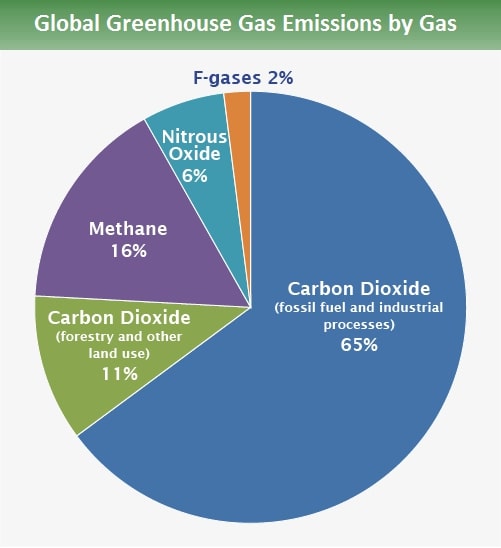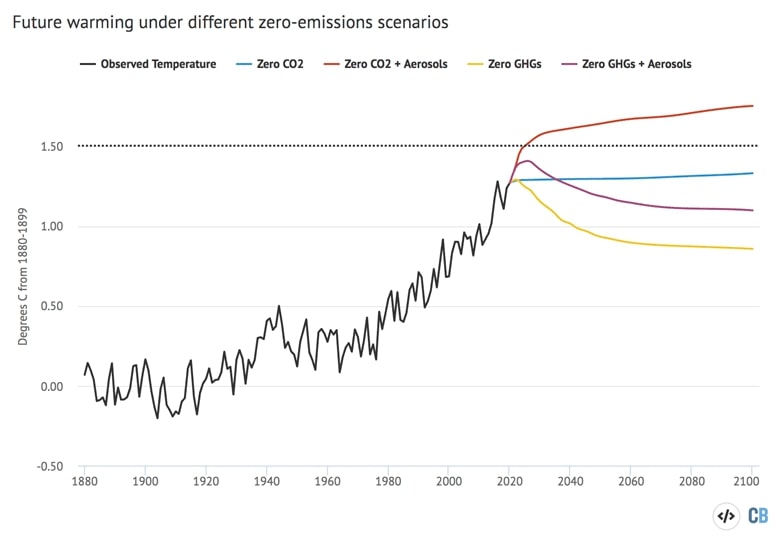Even if All Burning of Fossil Fuels Was Stopped Today Why Will Temperatures Continue to Increase
It is common knowledge today that excessive greenhouse gas emissions have been warming our atmosphere at driving climate change. Scientists, activists and politicians are calling for a stop to these emissions, but is that really enough? What would happen if we stopped using fossil fuels today?
—
The International Panel on Climate Change just recently released its sixth Assessment Report. What they found was an overwhelming amount of data on the present and potential effects of human-induced climate change on the earth. But if we got ourselves in this mess, is it likely that we can do enough to reverse the damage we've inflicted? Or is there no returning to sustainable conditions?
Greenhouse gases. Gases that allow life to thrive on earth by sheltering and providing warmth, just like a greenhouse. The gases—carbon dioxide, methane, nitrous oxide, fluorinated gases, etc.—trap solar radiation within the earth's atmosphere, making the earth warm enough for the habitation of all sorts of life. This process is known as the greenhouse effect.

A pie chart showing the percentages of different greenhouse gases in the atmosphere. Source: US Environmental Protection Agency
The greenhouse effect and greenhouse gas narrative is a necessary evil. Earth's average temperature without the greenhouse effect would be as cold as -18ºC, a staggering 30ºC lower than our current average temperature. But too much of anything can have severe effects, and the same goes with greenhouse gases. To understand how to mitigate our greenhouse gas emissions, we must first understand the beginning of the spike in emissions around 2 centuries ago.
The beginning of industrialisation saw copious amounts of greenhouse gases being pumped into the atmosphere, what with the discovery of cheap energy such as fossil fuels. The efficiency of using cheap energy in industrial processes triggered trends of mass production and consumption, leading the emissions rate to snowball and increase exponentially . Since the first industrial revolution in the 1760s, 375 billion tonnes of carbon dioxide alone have been emitted around the world, and that's disregarding the other more potent greenhouse gases like methane and nitrous oxide.

Source: IPCC AR6
The graph above demonstrates a near-linear relationship between cumulative CO2 emissions and the increase in global surface temperature . "Each 1000 GtCO2 (billion tonnes) of cumulative CO2 emissions is assessed to likely cause a 0.27°C to 0.63°C increase in global surface temperature with a best estimate of 0.45°C", the IPCC report states. Their tight correlation is highly suggestive of the fact that increasing anthropogenic greenhouse gas emission is going to cause mass changes in the weather patterns, habitation, and biodiversity. But if we stopped using fossil fuels today, would that stop temperature rise too? Or are we perennially stranded in these already dire conditions?
It is important that a distinction is made between stopping greenhouse gas emissions and reducing emissions to net-zero. What would happen if we just stopped producing carbon dioxide, the prevailing greenhouse gas, but made no effort to remove it from the atmosphere? As carbon sinks, our lands and oceans would absorb some of the CO2 in the atmosphere, thus reducing atmospheric temperatures over time. However, the CO2 left un-absorbed by the sinks would linger in the atmosphere for around 300-1000 years . As for the ocean, it would likely continue to warm until it reached the same temperature as the atmosphere, which would bring the earth back into radiative equilibrium . Radiative equilibrium refers to a scenario where incoming solar energy is balanced by an equal amount of energy being radiated back into space. At this point, global temperature is the most stable it can be . Studies predict that reaching radiative equilibrium (after stopping carbon emissions) would call for around 0.5ºC of further warming.
In a best-case scenario where we manage to reduce carbon emissions to net-zero, it was originally thought that temperatures would stay relatively constant. However, the recent IPCC report found that sustained net-zero carbon emissions would reverse the increase in surface temperature and potentially reverse surface ocean-acidification. It would not, however, interrupt the trajectory of other climate-change-induced phenomena such as sea level rise, expected to continue for decades to millennia.
The graph below, made by the folks at Carbon Brief, illustrates future warming under different scenarios.

A graph showing the trajectory of temperature increases in different zero-emissions scenarios. Source: Carbon Brief
While we focus on CO2 with good reason (its concentration makes it the main driver of global warming by far), other greenhouse gases are not to be underestimated. Methane, second in concentration to CO2, is also 28 times more potent, but has a lifespan of only 12-13 years. Vast amounts of methane are stored under frozen ground in the Arctic, and rising temperatures threaten to release it. Conversely, nitrous oxides mainly come from human activities, and while they persist for around 120 years and represent only 6% of emissions in the US, their heat-trapping ability is 250-300 times greater than CO2.
Although some greenhouse gases last for shorter periods in the atmosphere, we cannot afford to play the waiting game. With the effects of anthropogenic climate change becoming increasingly impactful, it is clear that reversing them is largely preferable to stalling them. If we stopped using fossil fuels today, warming would certainly slow, but greenhouse gas removal from the atmosphere will need to happen eventually.
This article was written by Alexandria Pu.
You might also like: 11 Interesting Facts About Climate Change.
Source: https://earth.org/data_visualization/what-would-happen-if-we-stopped-using-fossil-fuels/
0 Response to "Even if All Burning of Fossil Fuels Was Stopped Today Why Will Temperatures Continue to Increase"
Post a Comment